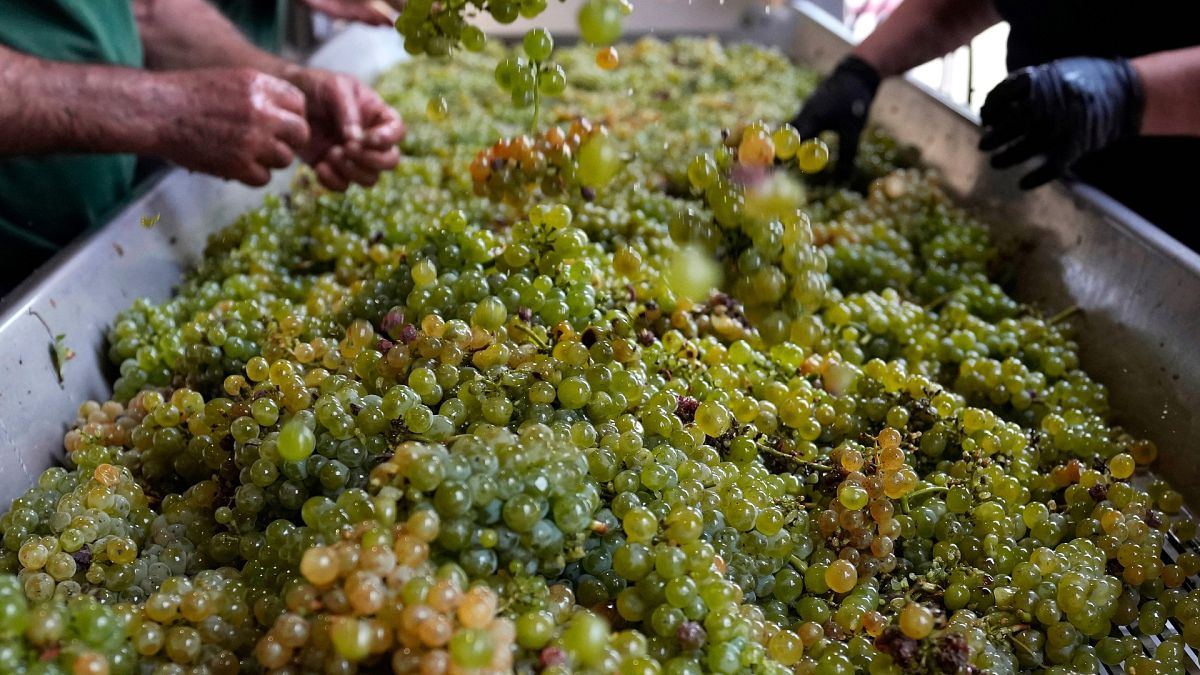A new report shows where has wine production dried up the most in Europe.
Global wine production reached a historic low in 2023 and climate change could be to blame, a new report has revealed.
The International Organisation of Vine and Wine (OIV) says the drink hit its lowest level since 1962. This intergovernmental organisation has 50 member states, representing 75 per cent of the world’s vineyard area.
Experts blame “extreme environmental conditions” including droughts and fires that have been driving the downward trend in production.
Okay, now shit is getting serious.
Well, it’s also hitting chocolate, coffee and beer.
If you watch John Oliver, the chocolate part is kind of a good thing even though it sucks for us. Well, not us. I refuse to have anything chocolate after watching that episode.
Havent watched it all season because they shifted the upload schedule. It no longer pops up on my youtube.
It’s up now. I warn you not to watch it if you ever want to eat chocolate again without feeling very guilty.
Here is an alternative Piped link(s):
https://www.piped.video/watch?v=FwHMDjc7qJ8
Piped is a privacy-respecting open-source alternative frontend to YouTube.
I’m open-source; check me out at GitHub.
Fun fact: tons of wheat and corn farmers had shit yields last year in my area. It’s not even that the temperature was higher, the weather was just all over the place and it fucked the plants.
Of course, it’s government policy to overproduce so much wheat and corn we can feed a substantial chunk of the world, so it’ll take longer before the basic staples start getting hit, but just you wait.
And not only will prices skyrocket, but also (at least in countries that allow it) agriculture businesses will take public money as restoration for the loss.
You forgot the part where prices stay high even after the supply recovers.
You’re right, my bad! The silver lining is that at least it may induce people to reduce consumption of unhealthy products and prefer quality over quantity.
Wait is wine a commodity?🤔 Legit can’t decide.
And they’ll also take an insane amount of local water supplies to fight nature and make a profit.
Scandinavian wine is going to be a thing soon…
Ice wine is already a thing and it is, apparently, produced in Sweden. Although a fraction of what Canada produces.
https://en.wikipedia.org/wiki/Ice_wine
I’ve never had it myself, but I keep meaning to try. It’s generally not the sort of thing restaurants on here have on their wine list and I hate spending a bunch of money on a bottle of wine only to find that I don’t like it.
You should! I think you’d enjoy it. It’s really incredible tasting, syrupy and sweet, like concentrated grape juice, has a unique flavor. Get a decent one, I ordered the cheap stuff a long time ago and it was meh. Expect to pay a bit because since the water content is removed as ice it only yields a tiny fraction of what a normal wine harvest would, and it’s harder to harvest because the grapes have to be picked at subfreezing temps. So, the bottles are small. If you want to go in on a 375ml bottle, it’s the kind of thing to enjoy out of a tiny glass after dinner shared with 1-3 friends. Cheers!
That definitely does sound good. Thanks!
How does 375 ml get split between 3 friends is what I want to know.
Tiny glasses; pours are more like a double shot than a full glass of wine, and you’re only having a little like a digestif.
It’s a dessert wine, very sweet
So I have heard, and I love port so I’d probably enjoy it, but it’s always a risk.
I think that’s just mead
Considering how things have been going for the bees, that might be on its way out, too.
Already is, these guys can get fussy, uncooperative Pinot Noir to ripen in gatdam Skåne!
All that I understood on that page was too keep Môôsës away from my sïstêrs.
I work in very high end restaurants.
Im starting to see wines come from appalations i would never consider to be “good” regions for these grapes, granted they are some of the oldest wine producing regions in the world.
Give it about 5-8 years, regions like champagne or barolo will be surpassed, replaced, and eventually considered low tier wines - though that last part will take a decade or two.
Its simultaneously exciting (yay new “classics”!) And terrifying.
I like this take. Tell me more: Do you think growers from those regions are already thinking ahead and buying up land for vineyards in locations that may do/are doing well in this “new climate”? If so, where are they and/or what are the Appalachians you are referring to? What we might consider New World Wines or something totally left of centre?
Wasn’t there something recently, that French wine farmers had a huge overproduction last year, so the government bought up their wine to distill into industrial alcohol to subsidize them?
Why are we enslaving ourselves to farmers that are first to destroy the environment they depend on and then also first to demand government bailouts?
On defense of farmers, why does the French government saving the wine industry a bad thing? They take the overstock that would have otherwise driven the prices to an unsustainable low and covert it into a useful product for another customer base?
You clearly have no idea what you are talking about.
If one year they need help because of overproduction and the next year they need help because of underproduction, for a product that can be easily stored for years, then we are obviously getting duped.
Here in BC, wine is one of our biggest industries. Winter killed off 99% of our vines. They have been given money to replant and survive, but we might be looking at the end of a major industry if these cold snaps are going to be an annual thing. And it’s not like you can just replant and go on as normal, this will take multiple growing seasons to recover. These are some of the best spots for summer seasonal work and a big part of BC tourism, it could all evaporate.
BC?
I’m assuming British Columbia Canada. Could be wrong though.
Maybe french officials will start to notice climate change now…
Hot years also sometimes lead to sweeter wine in addition to smaller harvests, so historically it has made wine much more expensive from those years.
Kind of weird to think about a dystopian future where a lot of stuff is mostly the same except Wine is something normal people will never be able to afford.
Is that why people go “Ah, ‘37, a very good year”?
It’s plainly undeniable phenomena like this why idiots have switched from climate denial to climate doomerism.
It’s fake and I don’t want to do anything about it -> It’s real and I don’t want to do anything about it
maybe try growing grapes somewhere else?
As a matter of fact that’s exactly what’s going to happen but it’s hard to change your production from one thing to another when your land has been used for a specific thing for (potentially) centuries. Your whole business is built around and equipped to produce grape and transform it into wine…
We’re seeing that in North America as well, Southern Ontario and Quebec might become one of the great places to produce wine (production is already happening but I’m taking prime real estate for it!) while traditional productions for the regions will need to move north…
Well, guess wine is now out of my price range soon.
This is the best summary I could come up with:
Global wine production reached a historic low in 2023 and climate change could be to blame, a new report has revealed.
Experts blame “extreme environmental conditions” including droughts and fires that have been driving the downward trend in production.
Vines are often cultivated in areas around the world that are strongly affected by and incredibly vulnerable to changes in climate.
These conditions have led to a sharp decline, impacting major wine-producing regions across the northern and southern hemispheres.
Heavy rainfall causing mildew in central and southern regions alongside flood and hail damage led to the smallest production volume since 1950.
Experts have warned that regular droughts could become the ‘new normal’ across the Mediterranean by mid-century if we don’t act on climate change immediately.
The original article contains 396 words, the summary contains 124 words. Saved 69%. I’m a bot and I’m open source!
Wait till you find out about the lantern flies in PA and NY
OK spill
As someone in PA lantern flies aren’t actually that bad. Over the last two years I’ve seen almost none. For a bit there you’d see parking lots full of the fuckers. I don’t think they’re really a threat, at least around me (Amish-Philly part of PA)
The liberal will finally be scratched by their lack of access to wine.
Wine is a waste of grapes
Whine is a waste of breath
deleted by creator










